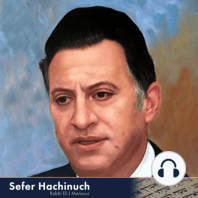20 min listen
Misva #390: That a Non-Kohen Not Performing the Service in the Bet Ha’mikdash
FromSefer Hachinuch
ratings:
Length:
20 minutes
Released:
Feb 9, 2023
Format:
Podcast episode
Description
The Torah commands in Parashat Korah (Bamidbar 18:4), “Ve’zar Lo Yikrab Alechem” – that a “foreigner,” a non-Kohen, is forbidden from performing certain Abodot (rituals in the Bet Ha’mikdash) which are assigned exclusively to the Kohanim. The Sages explained that these include all stages of offering a sacrifice beginning with the stage of “Kabbala” – receiving the blood when the animal is slaughtered. The Shehita (slaughtering) itself, however, is permissible for a Zar (non-Kohen), even Le’hatehila (optimally; meaning, not only is the sacrifice valid after the fact if it was slaughtered by a Zar, but this may be planned from the outset). Another Aboda which is permissible for a Zar is bringing the wood to the altar. According to the Rambam, a Zar is allowed also to kindle the Menorah. The cleaning and preparing of the lamps must be done by Kohanim, but, in the Rambam’s view, the lighting itself may be done by a Zar. The Rambam writes that a Kohen can bring the Menorah into the area where non-Kohanim are permitted, and have a non-Kohen kindle the Menorah there. The Kohen would then bring the Menorah to its place inside the Bet Ha’mikdash. The Sefer Ha’hinuch follows this opinion. There are four Abodot for which a Zar is liable to Mita Bi’ydeh Shamayim (death at the hand of G-d, as opposed to execution by the court) for violating this prohibition. They are: 1) Zerikat Ha’dam – sprinkling the sacrificial blood on the altar; 2) Hakraba – placing the required portions of the animal, or of the grain offering, on the altar; 3) Haktarat Ha’ketoret – offering incense on the altar inside the Bet Ha’mikdash; 4) Nisuch – pouring the libations (either wine or water) on the altar. This prohibition applies to both males and females. In principle, it applies even nowadays, as the Rambam ruled that the site of the Bet Ha’mikdash retains its sanctity even after its destruction, such that, fundamentally, sacrifices can be offered at the site even today. (It goes without saying that for several practical reasons, this cannot be done.) Theoretically, then, a non-Kohen could violate this command even nowadays by performing the Kohanim’s service at the site of the Bet Ha’mikdash.
Released:
Feb 9, 2023
Format:
Podcast episode
Titles in the series (100)
Misva #19: The Prohibition Against Eating Hametz on Pesach: Daily Sefer Hachinuch - Brought to you by itorah.com by Sefer Hachinuch
